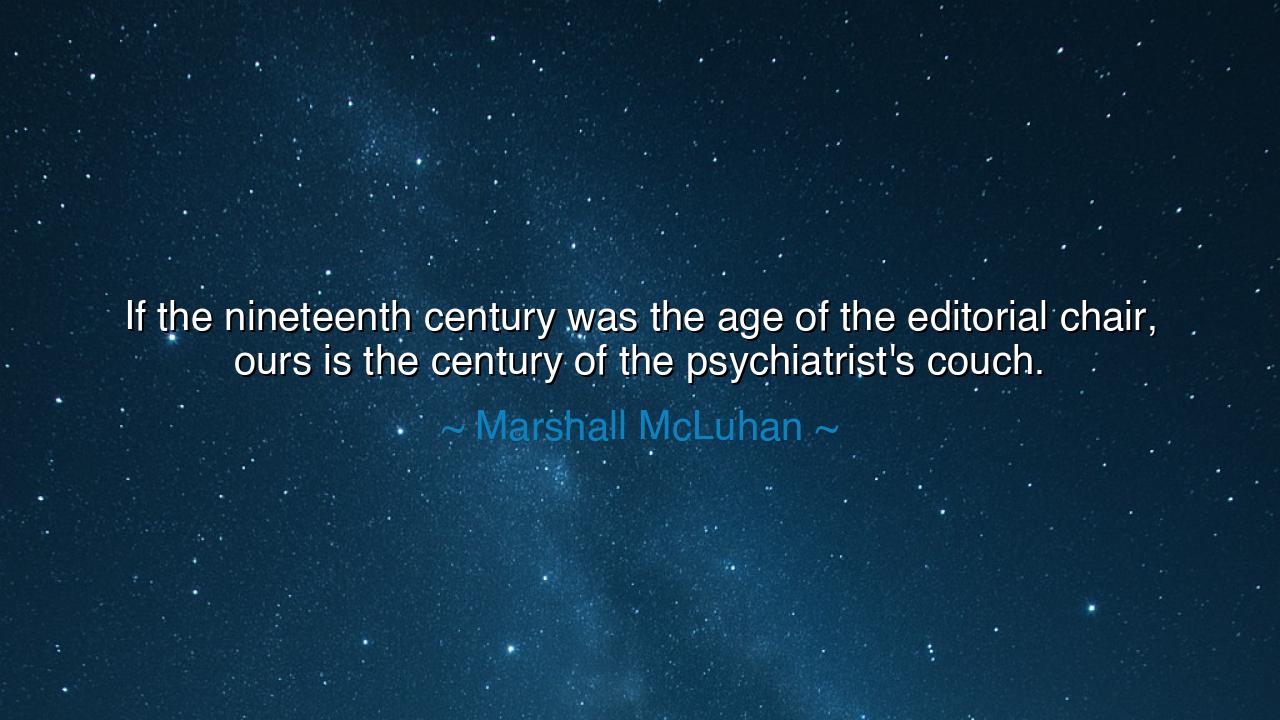
If the nineteenth century was the age of the editorial chair
If the nineteenth century was the age of the editorial chair, ours is the century of the psychiatrist's couch.






In the vast turning of human ages, the visionary scholar Marshall McLuhan once declared, “If the nineteenth century was the age of the editorial chair, ours is the century of the psychiatrist’s couch.” At first glance, these words seem to describe a mere change in professions — from the journalist to the therapist — but beneath them lies a prophecy of deep transformation. McLuhan, who saw into the soul of the media age as few others did, was not speaking only of jobs or technologies. He was speaking of the human spirit, of how each era mirrors its own wounds, and of how the tools of the age reveal what humanity seeks to heal.
In the nineteenth century, the editorial chair stood as the throne of reason and authority. It was the age of newspapers, pamphlets, and public discourse. The editor was the guardian of truth and opinion, shaping nations through the printed word. Society looked outward, confident in progress, invention, and debate. The written page carried the spirit of the Enlightenment — logic, analysis, persuasion — all aimed at taming the chaos of the world through intellect and order. Words were weapons of reform; arguments, the engines of civilization. Humanity believed that if only enough ideas were spread and enough ink spilled, reason would triumph.
But as the centuries turned, the human heart grew weary beneath the very structures it had built. The industrial world that once promised unity brought instead alienation. The machine that connected men also divided them; the city that offered opportunity also delivered loneliness. The twentieth century birthed a new kind of anxiety — inward, personal, invisible. Where once the editor guided society through external questions of progress, now the psychiatrist guided individuals through the internal labyrinth of fear, isolation, and identity. McLuhan saw this clearly: that we had shifted from the public age of argument to the private age of introspection. Humanity no longer sought truth in editorials but healing in confession.
Consider the story of Sigmund Freud, who, at the dawn of the twentieth century, sat not in the halls of power, but beside the trembling souls of ordinary people. His patients did not come to discuss politics or reform, but dreams and desires, guilt and grief. They did not seek to shape the world — they sought to understand themselves. Freud’s couch became the new altar of modernity, replacing the pulpit and the printing press as the place where truth was spoken. And though Freud’s science has since evolved, his legacy remains: we are still a civilization that looks inward for salvation, that treats the psyche as the battlefield of modern life.
McLuhan, ever the prophet of media, knew why this had happened. He saw that technology had transformed not only communication but consciousness. The old editor, seated before a press, spoke to the many; the psychiatrist, seated before one mind, listens to the few — yet both shape the collective soul. The electronic age, with its flickering screens and ceaseless noise, dissolved the firm structures of the past. Truth became fragmented, identity fluid, and the human being — once sure of his place in the world — turned inward, searching for meaning within. Thus, McLuhan’s quote is not nostalgia, but diagnosis: he tells us that the medium of our age reflects the maladies of our age.
But there is no condemnation in his words. For in every transformation lies both danger and hope. The editorial chair once gave birth to revolutions of thought; the psychiatrist’s couch may yet give birth to revolutions of empathy. Perhaps this turning inward is not the end of civilization, but its healing. For only when humanity understands its own pain can it hope to rebuild a world of truth and balance. McLuhan’s insight, then, is both a warning and a call — that we must learn to bridge the two: to think clearly, as the editor once did, and to feel deeply, as the patient now must.
So, O listener of this age, take this wisdom to heart. Do not let the noise of the modern world drown out your inner voice, nor let introspection turn to isolation. The world needs both the pen and the mirror — both thought and feeling. Seek knowledge, but also seek understanding of the self. Sit, at times, in your editorial chair, to discern what is true; and at other times, upon your psychiatrist’s couch, to listen to your own heart. For wisdom is not found in one or the other, but in the harmony between them — the balance of the outward and the inward, of intellect and compassion.
Thus, the teaching endures: every age reveals the soul of its people through the seat they occupy. The nineteenth century sought truth in words; ours seeks healing in reflection. Perhaps the age to come will unite the two — where reason will again walk hand in hand with empathy, and humanity will no longer need chairs or couches to understand itself, for it will have finally learned to listen both to the world and to the quiet voice within.






AAdministratorAdministrator
Welcome, honored guests. Please leave a comment, we will respond soon